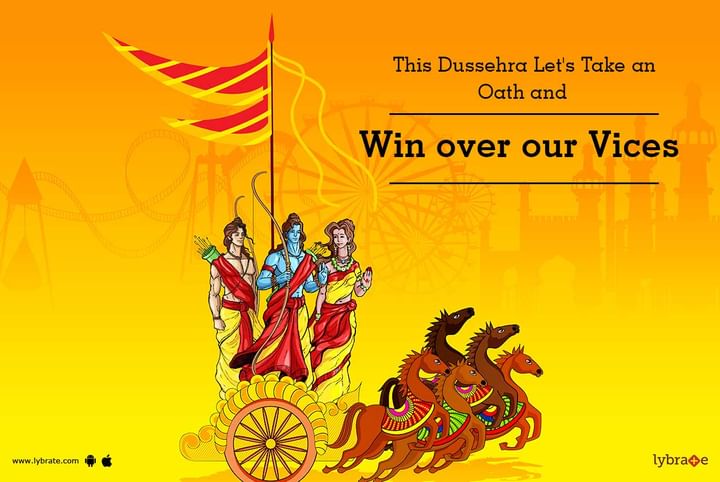This Dussehra Let's Take an Oath and Win over our Vices
Dussehra is the day when 'Raghunandan Ramachandra' defeated 'Lankapati Dashanan Ravana' and rescued his wife Sita. The name Dussehra has its foundations in two Sanskrit words Dasha and Hara, where the first word 'Dasha' refers to Dashanan Ravana and the second word 'Hara' implies defeat. Dashanana, one with ten heads, a title given to Ravana, additionally happens to be symbolic in nature. It could be seen as ten vices, not ten heads.
Vice is any behaviour or practice that is considered cruel, immoral, rude, sinful, degrading or criminal. The ten vices represent the ten heads of Ravana. If we carefully watch our surroundings, we will find that the majority of us are being tainted and infected from one of these ten vices. At last, it is not about Rama or Ravana. It is about you and your vices. Dussehra symbolises your triumph over your vices, not Rama's triumph over Ravana.
The ten vices that we need to win over this Dusshera are:
- Kama Vasana (Lust): This lustful craving edging on the unethical side that can make one carry out offensive and heinous crimes.
- Krodha (Anger): Many violations and crimes are caused because of the inability and powerlessness to think when we are in outrage. Control over Anger or Krodha will avoid a lot of problems and regrets in the near future.
- Moha (Attraction): Obsessing over things can be a problem when we lose the feeling and sense of our reason. It is ideal to keep our obsessions under control.
- Lobha (Greed): This problem is the reason for some possible crimes and embarrassments. That is why it is said that one should keep a long distance from greed for their own well-being.
- Mada (Pride): Being happy over material belongings has no purpose and is a worthless activity. It is both at the moment and temporary. Pride needs to be avoided and maintain a goal to stay modest and unobtrusive.
- Matsara (Jealousy): This green-eyed creature eats up our feeling of logic and calm and is better kept under control for our prosperity and fulfilment.
- Swartha (Selfishness): Being an egotistical individual just gets us back at last. Thoughtfulness usually pays back and helping a man in need will never go futile.
- Anyaaya (Injustice): As much as we can comprehend, we need to be just and not indulge in out of line practices, be it in our work or individual life.
- Amanavata (Cruelty): Cruelty needs to be avoided under all circumstances. Being thoughtful and humble will give us a meaning to live a modest and calm life.
- Ahankara (Ego): The bad habit of Ravana that destroyed Lanka is something we indulge in ordinary. Avoiding this ego will keep us more joyful in our lives.
This celebration implies the victory of good over the evil, right over wrong, and good habits over vices.



+1.svg)
